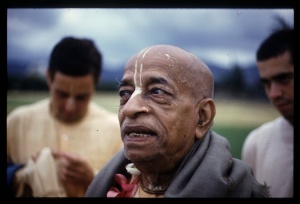SB 5.7.5: Difference between revisions
No edit summary |
(Vanibot #0054 edit - transform synonyms into clickable links, which search similar occurrences) |
||
| Line 22: | Line 22: | ||
<div class="synonyms"> | <div class="synonyms"> | ||
''īje'' | ''[//vanipedia.org/wiki/Special:VaniSearch?s=īje&tab=syno_o&ds=1 īje]'' — worshiped; ''[//vanipedia.org/wiki/Special:VaniSearch?s=ca&tab=syno_o&ds=1 ca]'' — also; ''[//vanipedia.org/wiki/Special:VaniSearch?s=bhagavantam&tab=syno_o&ds=1 bhagavantam]'' — the Supreme Personality of Godhead; ''[//vanipedia.org/wiki/Special:VaniSearch?s=yajña&tab=syno_o&ds=1 yajña]-[//vanipedia.org/wiki/Special:VaniSearch?s=kratu&tab=syno_o&ds=1 kratu]-[//vanipedia.org/wiki/Special:VaniSearch?s=rūpam&tab=syno_o&ds=1 rūpam]'' — having the form of sacrifices without animals and sacrifices with animals; ''[//vanipedia.org/wiki/Special:VaniSearch?s=kratubhiḥ&tab=syno_o&ds=1 kratubhiḥ]'' — by such sacrifices; ''[//vanipedia.org/wiki/Special:VaniSearch?s=uccāvacaiḥ&tab=syno_o&ds=1 uccāvacaiḥ]'' — very great and very small; ''[//vanipedia.org/wiki/Special:VaniSearch?s=śraddhayā&tab=syno_o&ds=1 śraddhayā]'' — with faith; ''[//vanipedia.org/wiki/Special:VaniSearch?s=āhṛta&tab=syno_o&ds=1 āhṛta]'' — being performed; ''[//vanipedia.org/wiki/Special:VaniSearch?s=agni&tab=syno_o&ds=1 agni]-[//vanipedia.org/wiki/Special:VaniSearch?s=hotra&tab=syno_o&ds=1 hotra]'' — of the agnihotra-yajña; ''[//vanipedia.org/wiki/Special:VaniSearch?s=darśa&tab=syno_o&ds=1 darśa]'' — of the darśa-yajña; ''[//vanipedia.org/wiki/Special:VaniSearch?s=pūrṇamāsa&tab=syno_o&ds=1 pūrṇamāsa]'' — of the pūrṇamāsa-yajña; ''[//vanipedia.org/wiki/Special:VaniSearch?s=cāturmāsya&tab=syno_o&ds=1 cāturmāsya]'' — of the cāturmāsya-yajña; ''[//vanipedia.org/wiki/Special:VaniSearch?s=paśu&tab=syno_o&ds=1 paśu]-[//vanipedia.org/wiki/Special:VaniSearch?s=somānām&tab=syno_o&ds=1 somānām]'' — of the yajña with animals and the yajña with soma-rasa; ''[//vanipedia.org/wiki/Special:VaniSearch?s=prakṛti&tab=syno_o&ds=1 prakṛti]'' — by full performances; ''[//vanipedia.org/wiki/Special:VaniSearch?s=vikṛtibhiḥ&tab=syno_o&ds=1 vikṛtibhiḥ]'' — and by partial performances; ''[//vanipedia.org/wiki/Special:VaniSearch?s=anusavanam&tab=syno_o&ds=1 anusavanam]'' — almost always; ''[//vanipedia.org/wiki/Special:VaniSearch?s=cātuḥ&tab=syno_o&ds=1 cātuḥ]-[//vanipedia.org/wiki/Special:VaniSearch?s=hotra&tab=syno_o&ds=1 hotra]-[//vanipedia.org/wiki/Special:VaniSearch?s=vidhinā&tab=syno_o&ds=1 vidhinā]'' — by the regulative principles of sacrifice directed by four kinds of priests. | ||
</div> | </div> | ||
Latest revision as of 22:21, 18 February 2024

A.C. Bhaktivedanta Swami Prabhupada
TEXT 5
- īje ca bhagavantaṁ yajña-kratu-rūpaṁ kratubhir uccāvacaiḥ
- śraddhayāhṛtāgnihotra-darśa-pūrṇamāsa-cāturmāsya-paśu-somānāṁ
- prakṛti-vikṛtibhir anusavanaṁ cāturhotra-vidhinā
SYNONYMS
īje — worshiped; ca — also; bhagavantam — the Supreme Personality of Godhead; yajña-kratu-rūpam — having the form of sacrifices without animals and sacrifices with animals; kratubhiḥ — by such sacrifices; uccāvacaiḥ — very great and very small; śraddhayā — with faith; āhṛta — being performed; agni-hotra — of the agnihotra-yajña; darśa — of the darśa-yajña; pūrṇamāsa — of the pūrṇamāsa-yajña; cāturmāsya — of the cāturmāsya-yajña; paśu-somānām — of the yajña with animals and the yajña with soma-rasa; prakṛti — by full performances; vikṛtibhiḥ — and by partial performances; anusavanam — almost always; cātuḥ-hotra-vidhinā — by the regulative principles of sacrifice directed by four kinds of priests.
TRANSLATION
With great faith King Bharata performed various kinds of sacrifice. He performed the sacrifices known as agni-hotra, darśa, pūrṇamāsa, cāturmāsya, paśu-yajña [wherein a horse is sacrificed] and soma-yajña [wherein a kind of beverage is offered]. Sometimes these sacrifices were performed completely and sometimes partially. In any case, in all the sacrifices the regulations of cāturhotra were strictly followed. In this way Bharata Mahārāja worshiped the Supreme Personality of Godhead.
PURPORT
Animals like hogs and cows were offered in sacrifice to test the proper execution of the sacrifice. Otherwise, there was no purpose in killing the animal. Actually the animal was offered in the sacrificial fire to get a rejuvenated life. Generally an old animal was sacrificed in the fire. and it would come out again in a youthful body. Some of the rituals however, did not require animal sacrifice. In the present age, animal sacrifices are forbidden. As stated by Śrī Caitanya Mahāprabhu:
- aśvamedhaṁ gavālambhaṁ
- sannyāsaṁ pala-paitṛkam
- devareṇa sutotpattiṁ
- kalau pañca vivarjayet
"In this age of Kali, five acts are forbidden: the offering of a horse in sacrifice, the offering of a cow in sacrifice, the acceptance of the order of sannyāsa, the offering of oblations of flesh to the forefathers, and a man's begetting children in his brother's wife." (CC Adi 17.164) Such sacrifices are impossible in this age due to the scarcity of expert brāhmaṇas or ṛtvijaḥ who are able to take the responsibility. In the absence of these, the saṅkīrtana-yajña is recommended. Yajñaiḥ saṅkīrtana-prāyair yajanti hi sumedhasaḥ (SB 11.5.32). After all, sacrifices are executed to please the Supreme Personality of Godhead. Yajñārtha-karma: such activities should be carried out for the Supreme Lord's pleasure. In this age of Kali, the Supreme Lord in His incarnation of Śrī Caitanya Mahāprabhu should be worshiped with His associates by performance of saṅkīrtana-yajña, the congregational chanting of the Hare Kṛṣṇa mantra. This process is accepted by intelligent men. Yajñaiḥ saṅkīrtana-prāyair yajanti hi sumedhasaḥ. The word sumedhasaḥ refers to intelligent men who possess very good brain substance.